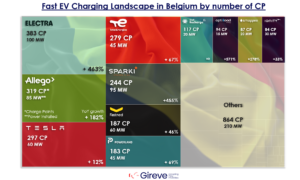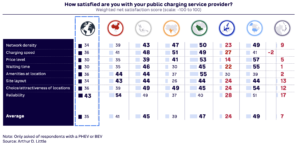Since late 2020, the number of slow charging points (AC) in the EU has increased more than threefold, surpassing half a million by the end of 2023. Fast charging points (DC), which are crucial for rapid recharging of EVs during longer journeys, have seen an even more dramatic surge, increasing by over fourfold within the same period. The total number of charging points installed across Europe now exceeds 630,000, a clear indication that the EU is on a solid path to achieving its goal of 1 million chargers by 2025 and 3 million by 2030.
France, among the four largest EU economies, is leading in terms of the number of publicly accessible charging points. With nearly 120,000 charging points, France matches Germany despite having fewer registered EVs and a lower population. Remarkably, the French fast charging network has expanded fivefold in less than two years, from 3,600 to 18,500.
Germany maintains its position with Europe’s largest fast-charging network, hosting almost 23,000 fast charging points by the end of 2023. This nearly quadruples its capacity since 2020, supporting a higher density of EVs and population.
Spain and Italy, although starting from lower levels, have also seen significant growth rates in their public charging networks. Spain’s slow charging infrastructure expanded by over 440% in three years, while Italy’s total number of chargers more than tripled, showing robust growth from both slow and fast chargers.
The rapid development of the charging infrastructure precedes the enforcement of the Alternative Fuel Infrastructure Regulation (AFIR), which was ratified in late 2023. AFIR is set to become fully enforceable across all EU member states by April 2024. This regulation mandates comprehensive coverage along Europe’s busiest roads and sets direct, fleet-based targets correlating the expansion of national public charging infrastructures with the number of registered EVs.
This surge in infrastructure development has also disproven the myth that the growth of the EV fleet is outpacing the ability of charge point operators (CPOs) to deploy new charging stations. By 2022-2023, the growth of charging infrastructure had caught up and even surpassed the growth rate of the EV fleet by 20%.
The commitment of the European Union to expanding its EV charging infrastructure is evident from the rapid growth observed in recent years. This development not only supports the increasing number of electric vehicles on the road but also significantly contributes to the EU’s environmental objectives. With continued support and progressive policies like AFIR, Europe is well on its way to becoming a leader in sustainable mobility, setting a global benchmark in the transition to green transport solutions.
Source: Transport & Environment




